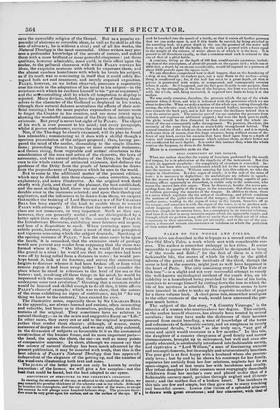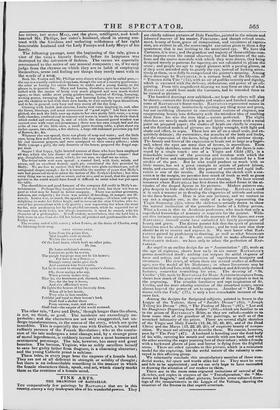TALES OF THE WOODS AND FIELDS.
THESE tales are described in the titlepage as a second series of the Two Old Men's Tales, a work which met with considerable suc- cess. The author is somewhat unhappy in her titles. It seems impossible to guess why these tales should be designated as being "of the woods and fields ;" for the first of them is a tale of fashionable life, the scenes of which lie chiefly in the gilded saloons of the great; and the incidents of the third, though the scene is laid in the country, might just as well have happened in the heart of Paris. The only remaining story—" The Tale of an Oak tree "—is a slight and not very successful attempt to versify the well-known mythological incident of the youth who, on his infidelity to a hamadryad being punished by the loss of his limbs, contrives to revenge himself by cutting down the tree to which the life of his mistress is attached. This production seems to have been inserted in order to make up the requisite number of pages for a three volume book. A short prose tale, somewhat analogous to the other contents of the work, would have answered the pur- pose much better. The subject of the first story, "A Country Vicarage," is the miseries of a woman who marriesabove her degree. This subject, as the author herself observes, has already been treated by several novelists ; but they have made the distresses of their heroines proceed from rustic breeding, a want of knowledge of the forms and refinements of fashionable society, and an unaptness in merely conventional details, " which " as she truly says, "any girl of sense and spirit would overcome in a few months." In this tale, the daughter of a country clergyman of good family and narrow circumstances, brought up in retirement, but well and even.ele- gantly educated, is accidentally introduced into fashionable society, and captivates a "Lord William," a man of fascinating exterior and accomplishments, but thoroughly and aristocratically heartless. The poor girl is at first happy with a husband whom she passion- ately loves ; but by and by he shows his contempt for her family, separates her entirely from her low relations, neglects her for an opera-singer, and at last treats her with harshness and cruelty. Her infant daughter (a little creature most engagingly described) withdrawn from her mother's care and placed under that of a fashionable nursery-maid, perishes through neglect and ill-treat- melt; and the mother dies of a broken heart. The incidents in this tale are few and simple, but they give rise to many touching and beautiful scenes. Louisa (the victim of a splendid alliance) is drawn with great sweetness; and her character, with that of her father, her sister Mary, and the plain, intelligent, and kind- hearted Mr. Phillips, her sister's husband. stand in strong con- trast with the frivolous and unfeeling selfishness of her right honourable husband and the Lady Fannys and Lady Marys of his family.
The following passage, near the beginning of the tale, gives a view of the vicar's homely fireside, before its happiness was destroyed by the intrusion of fashion. The verses we especially recommend to the notice of our musical composers ; as, if we may judge from the rhymes on which they are in habit of employing themselves, sense and feeling are things they rarely meet with in the words of a song.
Both Mr. Evelyn and Mr. Phillips were alintrit what might be called poor,— the one as a scantily-endowed clergyman, though the son of a country gentleman ; the other as having his entire fortune to snake, and a young family, as the phrase is, to provide for. Mary and Louisa, therefore, were but scantily fur- nished with the means of being very much plagued and very much waited upon; so that, unlike most young gentlewomen, instead of flirting, lounging, writing poetry, twanging the harp, and learning Latin, they were obliged to put the children to bed with their own hands, to wait entirely upon themselves, and to be, in general, very busy and very merry all the day long. Glowing with health and exercise, Louisa now came laughing in, and, after the kisses, blessings, and usual ceremonies of "good night " had been accom- plished, she took the little ones up stairs to her own pretty little room,—a snug little chamber, rendered cool in summer and warm in winter by the thick thatch which roofed and overhung it, and of which the diumoud-paned window was covered over with roses and jessamines; there was her own simple bed and the cribs of two of the little ones, a small green dressing- table, a glass about six inches square, two chaits, a few shelves, a huge old-fashioned porcelain jug full of flowers, &c. &c.
Whatever else was spared, there was plenty of soap and water ; and the little ones, being first well bathed, with cheeks like rosy apples, repeated their hum- ble and innocent prayers, and were consigned to their snowy pillows ; while Molly (except a girl), the only domestic of the house, prepared the frugal sup- per meal. Supper I that happy, light-hearted reunion of those who have been employed all day, which the late dinner of modern times has superseded—supper! that gay, thoughtless, chatty meal, which, for our sins, we shall see no more.
The fr....I tattle %yea soon spread : a roasted fowl, with fruit, salads, and cream, and an excellent homely apple pie, constituted the fare provided by Molly. We are free to confess that the dishes were plain earthenware, and of antiquated shapes enough ; for it is incredible the number of years that Molly's care had preserved them to adorn the shelves of Mr. Evelyn's kitchen,. but then every thing was so neat, and so sweet, and so nire, and so good, that the greatest epicure in the world would have found it difficult to resist what was put upon the table.
The cheerfulness and good-humour of the company did credit to Molly's en- tertainment. Perhaps they laughed somewhat too loud, but their wit was as good as what may be found in better company. There was neither grossness, rudeness, nor vulgarity ; for there was neither ill-breeding, ill-temper, nor ill. morals. Louisa was, asaisual, the sparkler of the group,—all whim and spirits, delighting to make her father kingh, and to torment the stoic Charles, who re- ceived her provocations with a sly gravity ; now repressing her when she went too far, now awakening her by his playful sarcasms, while he regarded her at the same tune with looks, not alwap consistent, it must be owned, with his
character of a philosopher. It was evident, sieve, theless, that she held him a little more in awe than she did her father, all polished and gentlemaulike as Mr. Evelyn was. The evening ended with music ; when Louisa, at the desire of Charles, sang the following little sung.
LOVE VINDICATED.
Love from the palace flies,
'Alul hullIbie roofs to dwell : Within the secret cell
Of the fund heart, which bath no other prize,
lie lies.
Ile hates ambition's storms, Luxurious pi ide he scorns,
The purple hangings may not be his bower ;
i
For love s as a flower,—
Though sunny smiles give birth
And m111111100 hint from earth,
Yet he is reared to strength by sorrow's shower.
Oh, those malign who say, When paverty makes way, That he, the beauteous god, alarmed, retires: No—for the boy is brave, And o'er affliction's wave
He lights the beacon of his heavenly fires.
When all is lost beside, They who in him confide, Faithful and loyal to their bosom's lord, Shall find a shelter there
Front sorrow, want, and care— Shall find—the empire of the world restored.
The other tale, "Love and Duty," though longer than the above, is not, we think, so good. The incidents are exceedingly im- probable; and the characters are not only exaggerated, but un- dergo transformations, in the course of the story, which are quite incredible. This is especially the case with Guibert, a brutal and ruffianly parvenu of the French Revolution; who at the conclu- sion of the tale undergoes a total change, and, by a strange piece of moral legerdemain, is suddenly turned into a most humane and sentimental personage. The tale, however, has many and great beauties. The heroine, Virginie, who so nobly sacrifices herself to save her guilty father from disgrace, is a charming character; and the young Catholic priest is sublime. These tales, in every page bear the impress of a female hand. They are not at all deficient in strength or solidity of thought; but there is an indescribable something in the manner in which the female characters think, speak, and act, which clearly marks them as the creations of a female mind.



























 Previous page
Previous page